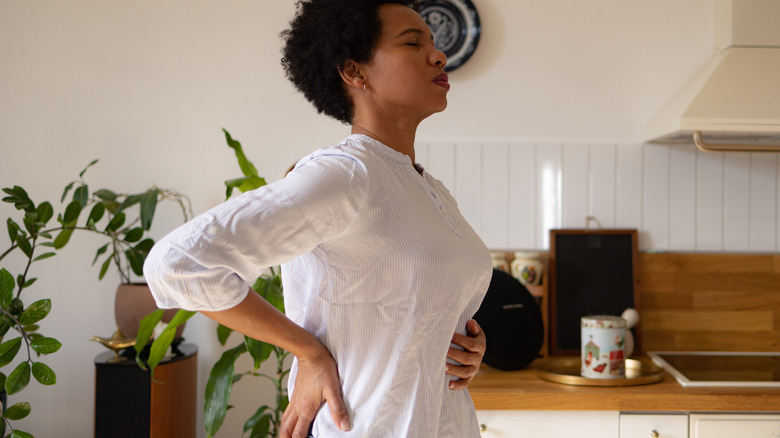When You Don't Eat, This Is What Happens To The Acid In Your Stomach
People stop eating food for a number of reasons. You might be on a diet, or perhaps you thought you'd give intermittent fasting a go. Or maybe you're observing Ramadan fasting or choosing to go on a 40-day fast before Easter. Or you simply forgot to eat because you've had a long and busy day.
Whatever the reason, something happens in your stomach when you don't eat for long periods, and it has to do with your stomach acid, the digestive juices your body produces to help absorb food. As explained by Dr. Peyton Berookim, a gastroenterologist with the Gastroenterology Institute of Southern California in Beverly Hills, to Livestrong, "When there are no contents or food in the stomach for it to break down, such as when one is fasting, stomach acid levels can start to increase. But if there's no food in the stomach to 'soak up' the acid, this can result in harmful acid buildup that can cause epigastric pain, discomfort (heartburn) and regurgitation of the acid into the esophagus (acid reflux)."
However, this is not the only thing that happens when stomach acid builds up in your digestive system.
You will experience hunger pains when you don't eat
Ever wondered why and how your body reacts to stomach pain when you go for long periods without food? You can blame the stomach acid for this particular discomfort, per Medical News Today.
Also referred to as "hunger pangs," this uncomfortable sensation can feel like a hollow, gnawing, or empty feeling in your belly. When your body has gone without food for a number of hours, your brain triggers the release of the hunger hormones ghrelin and motilin. These hormones then signal the release of stomach acids to help prepare for the digestion of the food. When no food is ingested, these accumulated stomach juices can irritate your digestive system, leading to heartburn, hunger pangs caused by stomach contractions, nausea, and acid reflux. You can also feel lightheaded, tired, and "hangry" because of not eating food, per Dr. Axe.
Does this mean you should avoid going for long periods of time without food? Not necessarily. Spiritual and health reasons for fasting are known to bring physical and mental health benefits for people. In fact, intermittent fasting has even been linked with contributing toward a healthy gut, per Healthline. According to Dr. Peyton Berookim (via Livestrong), your body (and stomach) will adjust to fasting — and gradually reduce how much acid it secretes — the more you do it. Even so, there are things you can do to avoid this acid buildup and hunger pangs in your stomach.
How to go without food and avoid stomach-acid related discomfort
The key to preventing stomach-acid-related discomfort when you don't eat is to follow certain tips, like hydrating frequently and making sure you're eating the right kind of foods when you do break fast. Dr. Peyton Berookim suggested water, preferably warm alkaline water in small amounts (via Livestrong).
According to internal disease specialist Dr. Indra Satiavani, paying attention to what you eat when you eat can mitigate the effects of acid reflux when you fast (via EMC Healthcare). Prioritize high-fiber foods like fruits, vegetables, and whole grains. Including probiotics like yogurt in your diet can also help your gut. You will also be helping out your stomach if you cut down on your caffeine, smoking, and alcohol, as well as spicy, sour, and fatty foods. "Avoid sleeping or lying down after eating, preferably [sit] or [stand] for at least two hours after eating," shared Dr. Satiavani.
That being said, not everyone should consider going without food for long periods of time. Even though there's some science to back the benefits of gut microbiome improvement in those with irritable bowel syndrome (IBS) who fast, there are also instances when going for long periods without food can exacerbate IBS symptoms. Ultimately, it's best to run these concerns by your doctor before you think about adopting a new diet, especially when underlying health conditions are involved.



